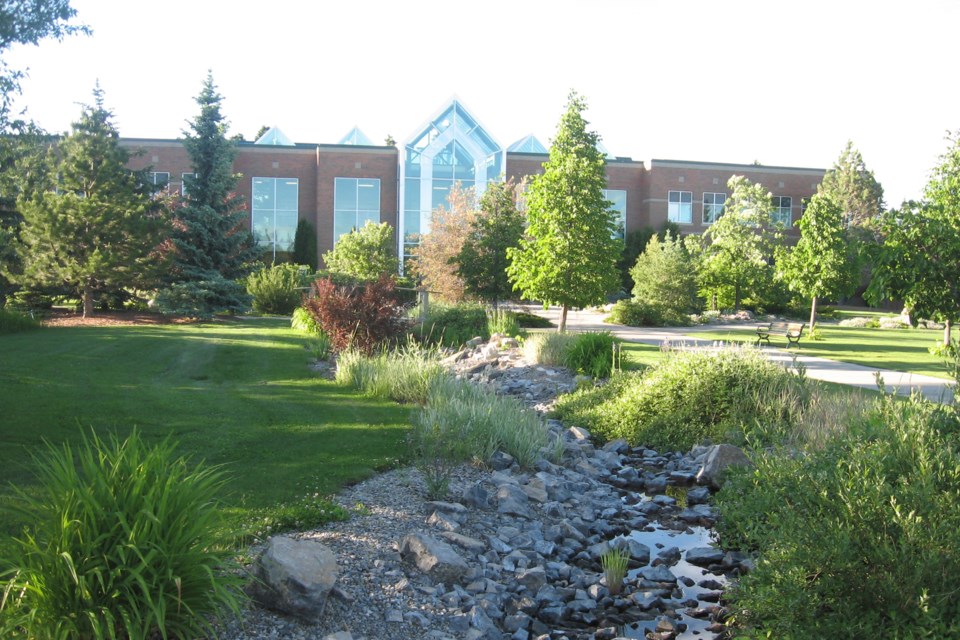OLDS — Olds College and the Agriculture Financial Services Corporation (AFSC) have created a formal partnership by signing a memorandum of understanding.
The memorandum between the two entities was announced at a live media event during AgSmart 2022, held Aug. 9-10 on the Olds College Campus.
During its five-year life, the memorandum of understanding will be governed by a committee representing both Olds College and AFSC.
The AFSC is a provincial Crown corporation that provides agricultural producers and agribusinesses in Alberta with loans, crop insurance and farm income disaster assistance.
As part of the memorandum of understanding, the AFSC will support applied research at the college’s Smart Farm, designed to spur innovation in agriculture.
In turn, The Smart Farm provides AFSC with a chance to test technologies and practices that could help producers in real agriculture settings.
That includes support to disseminate results of those products and services to producers, clients and other industry stakeholders.
“AFSC has a distinguished history in supporting and building Alberta’s agriculture sector and Olds College is delighted to formally partner with AFSC as we work together on industry-driven applied research,” Patrick Machaeck, Olds College’s vice-president of development & strategy, said in a news release.
“Our Smart Ag Ecosystem is a fundamental asset for industry, researchers, faculty, and students, to develop and integrate technology and best practice,” he added.
“The Smart Farm gives us the opportunity to work closely with AFSC to provide technical solutions and training opportunities for the agriculture and agri-food industry — and develop solutions to real-world, everyday agricultural challenges.”
Darryl Kay, chief executive officer of AFSC, also praised the deal.
“Our growing partnership with Olds College continues to benefit producers, our clients and the agri-food industry in Alberta,” he said in the news release.
“The joint applied research initiatives we’ll be undertaking over the next five years will advance knowledge and work to improve data collection and analysis, sensor testing and validation, automation technologies, field trials, and risk management.
“We look forward to the road ahead — and discovering ways we can use digital technologies, automation, and ag tech equipment to benefit the agriculture industry in Alberta.”
Nate Horner, Alberta’s Minister of Agriculture, Forestry and Rural Economic Development, also weighed in.
“I’m pleased to see the growing partnership between AFSC and Olds College,” he said in the news release.
“Smart investments and partnerships like this help solidify the province’s agricultural research and technology leadership.
“We are looking to the producers and processors driving innovation in agriculture to lead Alberta’s economic recovery.
“Our government will continue to invest in them to help rural Alberta grow and succeed.”
Olds College and AFSC are collaborating on three new projects this year:
The Olds College research team worked on a proof-of-concept with AFSC during the 2021 growing season to see if using drone imagery in hail damaged fields could assist the assessment process.
“Promising initial results showed that drones could provide a good overview of the extent of damage," the news release said.
“The mutually positive experience executing this project helped turn the working relationship between AFSC and the Smart Farm into a longer-term partnership.”
During the 2022 growing season, Olds College researchers are visiting fields after hailstorms to see if high-definition imaging from drones can be used to classify hail-damaged areas within crop fields.
Researchers will create a database of hail-damaged crops imagery and see if that could assist ASFC adjusters in the assessment process.
The college is also conducting research to determine if soil moisture measurements captured by soil-sensing probes can be used when estimating the yield potential of forage.
It's hoped that that will provide learning opportunities for AFSC’s Moisture Deficiency Insurance (MDI) program, which compensates participating producers who experience low forage production due to a lack of soil moisture.
Olds College researchers are also performing a historical data correlation analysis with AFSC to learn what variables matter most to forage growth, including historical precipitation, soil moisture measurements, forage yield records, and other relevant weather measurements.
"These data sets provide the opportunity for a correlation analysis and model development to determine if forage yield can be estimated and modelled using soil moisture and weather data,” the news release says.
Olds College and AFSC are also collaborating on ways to provide producers with innovative training and educational programming on new production methods and technologies.



